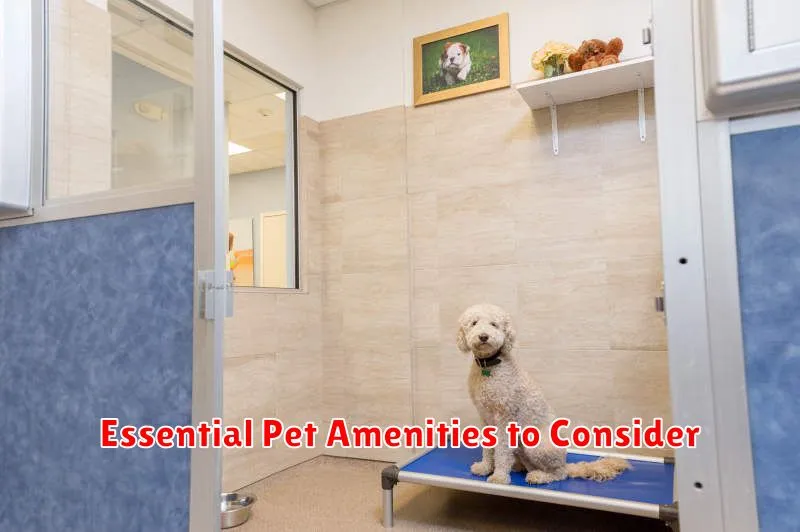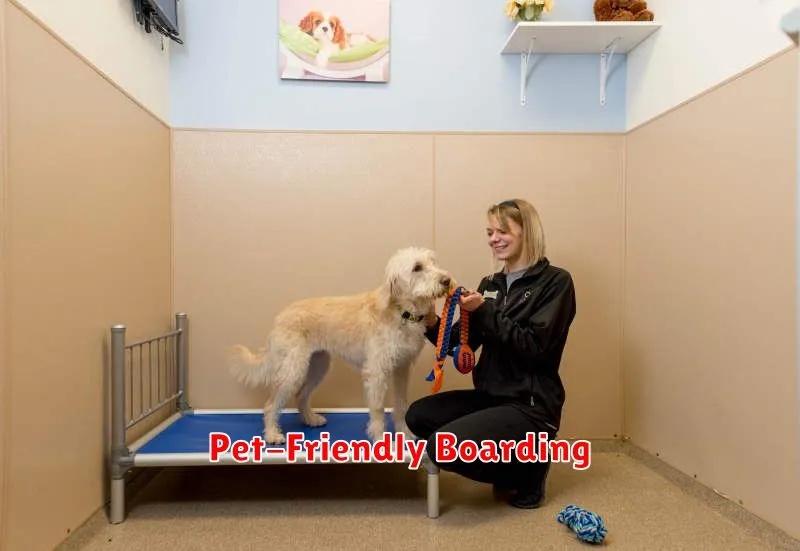Finding the perfect pet-friendly boarding house rental can be a challenge, but it doesn’t have to be! This guide will walk you through the process of securing a safe and comfortable space for you and your furry, feathered, or scaled friend. We’ll cover essential tips for your search, including where to look for pet-friendly rentals, how to negotiate with landlords, and what questions to ask to ensure a smooth and stress-free move-in. Let’s find your new pet-friendly boarding house together!
Introduction: The Rise of Pet-Friendly Rentals
The pet-owning population is booming, and with it, a significant increase in demand for pet-friendly rentals. More and more people view their pets as integral members of their families, making the inclusion of furry friends in housing searches a non-negotiable factor. This shift in societal attitudes has directly influenced the rental market, leading to a noticeable rise in the number of landlords and property management companies offering pet-friendly options.
This increasing demand hasn’t gone unnoticed. Landlords are recognizing the potential for attracting a wider pool of tenants by accommodating pets. This trend is especially prevalent in urban areas where pet ownership is high, and competition for rental properties is fierce. Consequently, we’re seeing a growing number of boarding houses and other rental properties explicitly advertising their pet-friendly policies, often with varying degrees of pet fees and restrictions.
Understanding this rising trend is crucial for anyone searching for a pet-friendly boarding house rental. Knowing the market is becoming increasingly receptive to pet owners allows you to approach your search with confidence and leverage this change in the rental landscape to your advantage. The following sections will provide practical tips and strategies to effectively navigate this evolving market and find the perfect pet-friendly home for you and your beloved companion.
What to Look for in a Pet-Friendly Boarding House
Finding a pet-friendly boarding house can be challenging, but with careful consideration, you can find a great place for you and your furry friend. Safety is paramount. Look for secure fencing, especially if you have a dog prone to escaping. Consider the location; is it close to parks or walking trails for convenient exercise? Also, check for pet-related amenities such as designated pet areas, waste disposal stations, and even on-site pet services.
House rules are critical. Understand the house’s pet policy thoroughly. What types of pets are allowed? Are there weight or breed restrictions? Are there additional fees or deposits? Clarify these details upfront to avoid misunderstandings. Also, inquire about the housemates; are they pet-friendly and compatible with your pet’s temperament? A harmonious living environment is essential for both you and your animal companion.
Finally, don’t hesitate to ask questions and inspect the property carefully. Check for potential hazards like exposed wires or toxic plants. Look for signs of cleanliness and adequate space for your pet. A thorough inspection will help you identify a safe and comfortable boarding house for you and your beloved pet. Remember, finding the right place requires careful planning and diligence.
Top Cities Offering Pet-Friendly Boarding Rentals

Finding a pet-friendly boarding house rental can sometimes feel like searching for a needle in a haystack. However, several cities are increasingly accommodating to pet owners, offering a wider range of pet-friendly options.
New York City, NY: While known for its high cost of living, NYC boasts a surprisingly robust market for pet-friendly rentals, particularly in certain boroughs like Brooklyn and Queens. Many landlords are recognizing the increasing demand and are adapting.
Los Angeles, CA: LA’s laid-back atmosphere extends to its pet-owning population. Numerous apartments and boarding houses in various neighborhoods welcome pets, often with pet-related amenities like dog parks nearby.
Austin, TX: Known for its dog-friendly parks and outdoor activities, Austin is a haven for pet owners. Competition for pet-friendly rentals can be high, so early searching is recommended.
Seattle, WA: Seattle’s strong pet-owner culture translates into a decent number of pet-friendly boarding houses, especially in areas with more green spaces and lower-density housing.
Denver, CO: Denver’s outdoor-focused lifestyle means many rentals cater to pet owners. Expect to find pet-friendly options in various neighborhoods, often with easy access to hiking trails and parks.
Important Note: While these cities offer a higher concentration of pet-friendly options, always verify pet policies directly with landlords or property management companies before signing a lease. Breed restrictions and pet fees are common, so understanding these details upfront is crucial.
Tips for Negotiating Pet Policies with Landlords
Finding a pet-friendly boarding house can be challenging, but don’t give up! Negotiating with landlords is often possible. Here are some tips to increase your chances of success:
Be upfront and honest. Disclose your pet early in the process. Don’t wait until after you’ve signed a lease. Provide all relevant information about your pet’s breed, size, and temperament.
Offer a pet deposit. Landlords are often concerned about potential damage. Offering a larger security deposit or a separate pet deposit can alleviate their concerns. Be prepared to discuss the amount you’re willing to pay.
Provide references. If you’ve rented before with a pet, provide references from previous landlords who can vouch for your responsible pet ownership. This demonstrates your commitment to keeping the property clean and undamaged.
Highlight your pet’s good behavior. Emphasize your pet’s well-trained nature and their tendency to be quiet and well-behaved. Landlords may be more receptive to your request if you can present your pet as a low-risk tenant.
Propose a pet addendum. This document outlines the specific responsibilities you will take on as a pet owner, such as cleaning up after your pet and any potential extra fees for damages. This shows you’re serious and proactive about responsible pet ownership.
Be prepared to compromise. The landlord may not be willing to allow all pets or might have certain breed restrictions. Be open to discussing alternative solutions, such as a smaller pet or agreeing to additional stipulations.
Be polite and professional. Maintain a respectful and courteous demeanor throughout the negotiation process. Remember, your attitude and approach will significantly influence the landlord’s decision.
Essential Pet Amenities to Consider

Finding a pet-friendly boarding house requires careful consideration of your pet’s needs. Pet amenities can significantly impact your pet’s comfort and well-being during your stay. Prioritize those that cater to your pet’s specific breed and temperament.
Designated pet areas are crucial. Look for properties offering secure, fenced yards or designated walking areas to ensure your pet’s safety and prevent escapes. Consider the size and layout of these areas; a small space might not suffice for an active dog.
Access to fresh water and food bowls is essential. While you’ll likely provide these, check if the boarding house provides convenient locations to place them. Pet waste disposal stations are also a must-have for responsible pet ownership.
Nearby pet services can be a game-changer. Check for proximity to veterinary clinics or pet groomers, particularly important in case of emergencies. Consider if the boarding house allows pets of all sizes and breeds, ensuring your furry friend is welcome.
Finally, inquire about pet-related rules and regulations. Some boarding houses may have restrictions on the number of pets allowed, or specific breeds might be prohibited. Clarifying these details upfront will prevent any misunderstandings or disappointments.
How to Manage Living with Roommates and Pets
Finding a pet-friendly boarding house can be a great solution, but successfully navigating shared living with roommates and pets requires careful planning and communication. Open and honest communication is key. Before moving in, discuss pet-related expectations with your potential roommates. This includes everything from pet allergies and cleaning responsibilities to noise levels and designated pet areas within the shared space.
Establish clear house rules regarding pet care and behavior. This could involve agreeing on who will be responsible for cleaning up after pets, feeding schedules, and designated areas where pets are allowed or not allowed. A written agreement can be helpful to avoid misunderstandings and disagreements down the road. Consider including details like pet-sitting arrangements during vacations or emergencies.
Respect shared spaces. Keep your pet’s belongings organized and contained. Regularly clean up after your pet to maintain a hygienic living environment for everyone. Be mindful of noise levels, particularly during quiet hours. If your pet has a tendency to bark excessively, consider implementing strategies to manage this behavior, such as training or providing enrichment activities.
Regularly communicate with your roommates about any concerns. Don’t hesitate to discuss issues before they escalate. A proactive approach can prevent minor problems from becoming major conflicts. Remember that compromise and mutual respect are vital for harmonious cohabitation with roommates and pets.
Ultimately, living successfully with roommates and pets in a shared space relies on respect, communication, and established ground rules. By addressing potential issues upfront and maintaining open dialogue, you can create a positive and comfortable living environment for everyone involved.
Common Rules and Restrictions for Pet-Friendly Rentals
Finding a pet-friendly boarding house can be a relief for pet owners, but it’s crucial to understand the common rules and restrictions that often accompany these rentals. These regulations are designed to protect both the property and other residents.
Pet Fees: Many pet-friendly rentals charge a pet fee, either a one-time payment or a recurring monthly fee. This covers potential extra cleaning or repairs needed due to pet damage. Pet deposits are also common, acting as a safeguard against damages. Be prepared for these added costs.
Breed Restrictions: Some landlords may have breed restrictions, prohibiting certain dog breeds deemed aggressive or high-risk. It’s essential to confirm whether your pet’s breed is allowed before applying. Similarly, there might be restrictions on pet size and weight.
Number of Pets: Landlords often limit the number of pets allowed per unit. This keeps the environment manageable and prevents overcrowding. This number is usually clearly stated in the rental agreement.
Pet Behavior: Maintaining a well-behaved pet is crucial. Rental agreements frequently require owners to ensure their pets don’t disturb other residents through excessive barking or other disruptive behaviors. Proof of vaccinations and pet insurance may also be required.
Cleaning and Damage: Pet owners are usually responsible for any cleaning or repairs necessary due to their pet’s actions. This may include cleaning up accidents, repairing damage caused by scratching or chewing, or addressing any unpleasant odors left by pets. Understanding these responsibilities beforehand prevents future conflicts.
Always carefully read the rental agreement. Don’t hesitate to ask clarifying questions about the pet policy before signing any lease to ensure a smooth and harmonious living experience for both you and your pet.
Conclusion: Creating a Comfortable Space for You and Your Pet
Finding a pet-friendly boarding house can be a game-changer for pet owners. It eliminates the stress of leaving your furry friend behind and allows you to enjoy your stay knowing they are comfortable and safe. By carefully considering factors like pet policies, amenities, and the overall environment, you can create a truly comfortable space for both you and your beloved pet. Remember to thoroughly research potential rentals and communicate your pet’s needs clearly. A little preparation can make all the difference in finding the perfect pet-friendly home away from home.
Ultimately, the key is to find a balance between your needs and your pet’s needs. Consider the size of the space, the availability of outdoor areas, and the proximity to veterinary care. Choosing the right boarding house is about more than just finding a place to stay; it’s about creating a positive and enriching experience for everyone involved. With a little effort, you can find a boarding house that will make you and your pet feel right at home.
This process of finding the right boarding house rental isn’t just about securing accommodation; it’s about building a happy and healthy environment for you and your pet. By being proactive and thorough in your search, you can guarantee a comfortable and enjoyable experience for both of you, easing the transition and ensuring a memorable stay. So start your search today and find the perfect pet-friendly haven!

